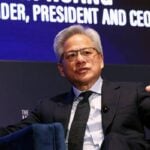Virtually every investor has heard of the firm Nvidia (NVDA) — a technology company that started by designing powerful graphics processing units (GPUs) before becoming a leader in AI hardware and software. However, the story of Nvidia’s founder and CEO, Jensen Huang, is not as well known but just as compelling.
Huang came from humble beginnings, working as a dishwasher at Denny’s, where he often had to clean the toilets.
Today, his company boasts a market capitalization of US$3.29 trillion, and, at the beginning of 2025, Huang ranked as the 15th richest person in the world with a net worth of US$115 billion, according to the Bloomberg Billionaires Index.
Rise and fall of Nvidia (NVDA)
As a leader in AI, Nvidia benefitted greatly when ChatGPT debuted in late 2022. It was a pivotal moment in the tech-sector with AI, capturing the world’s attention. Nvidia, a key player in powering AI advancements, quickly became a market darling as investors flocked to AI-driven opportunities.
By 2023, Nvidia (NVDA) shares skyrocketed by 239% — momentum that continued into 2024, with the stock valuation increasing another 171.25%, year-to-date. This meteoric rise reflects the market’s insatiable appetite for AI technology and Nvidia’s pivotal role in its development.
However, the stock’s trajectory has not been without fluctuations. Nvidia reached an all-time high of US$149.42 on January 6, 2025, but has since retraced some of its gains.
Rise and fall of Huang’s Nvidia (NVDA) fortune
Huang’s wealth is largely tied to his holdings in Nvidia shares. According to a March 2024 filing cited by Bloomberg, Huang owns more than 3.5% of the company. That means as Nvidia’s share price fluctuates, so does Huang’s fortune. At the end of 2022, Huang’s net worth hovered around US$13.8 billion. By the close of 2023, his wealth had surged to US$44.0 billion, marking a staggering 219% increase in just one year.
As the upward trajectory of Nvidia shares continued into 2024, Huang’s fortune received a further boost. On June 18, 2024, Huang’s net worth reached an all-time high of US$119 billion, coinciding with Nvidia shares hitting their peak.
Since the peak share price, last year, Nvidia’s stock price has fallen. As a result, Huang’s net worth has declined — sometimes at a remarkable rate. For instance, in September 2024, Huang’s net worth fell to US$95 billion, reflecting a loss of approximately US$24 billion in just two months. While his networth has rebounded since then — back iup to US$115 billion, these fluctuations highlight how investors should be mindful of the volatility of the tech sector and the need to diversify in order to safeguard their finances against economic headwinds.
Diversification strategies
For tech magnates like Huang, their wealth is often intrinsically linked to the companies they helped create. For the average investor diversifying their portfolio can help mitigate risks and protect their assets from the wild swings of a single stock.
Keep mind what the investing Warren Buffett once said, “I do not think the average person can pick stocks.” To combat this disadvantage, Buffett suggests investing in low-cost index funds, particularly those that track the S&P 500 Index.
(Buffett is so bullish on this strategy that he’s even revealed that after he dies, 90% of his wife’s inheritance will go into “a very low-cost S&P 500 index fund.”)
By investing in an S&P 500 index fund, an investor gains exposure to a broad range of large-cap companies, providing diversified holdings across various sectors of the economy. This means that if one stock tumbles, the impact on the overall portfolio will be limited.
There are quite a few options available, including exchange traded funds (ETFs) such as the Vanguard S&P 500 ETF (VOO) and the iShares Core S&P 500 ETF (IVV). Investors can also consider sector-specific ETFs for targeted exposure to particular sectors.
Additionally, it’s important to remember that diversification isn’t limited to stocks. You can also spread investments across other asset classes like bonds, real estate and commodities.
Given that each individual has unique investment goals and risk tolerance, it might be beneficial to consult with a financial professional to help tailor your investment approach to your specific circumstances and goals.
Sources
1. Bloomberg: Bloomberg Billionaires Index
2. Finance Charts: NVDA Stock
This article provides information only and should not be construed as advice. It is provided without warranty of any kind.
